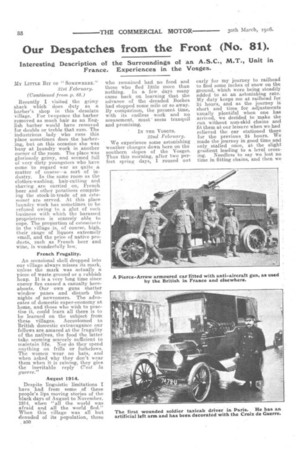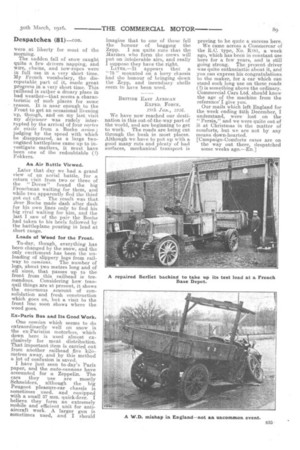Our Despatches from the Front (No. 81).
Page 6

Page 7

If you've noticed an error in this article please click here to report it so we can fix it.
Interesting Description of the Surroundings of an A.S.C., ACT., Unit in France. Experiences in the Vosges.
MY LITTLE BIT OF SomEwHEEE."
21st February.
(Continued from, p. 68.) Recently I visited the grimy shack which does duty as a barber's shop in this desolate village. For twopence the barber removed as much hair as an English barber would have removed for double or treble that sum. The industrious lady who runs this place sometimes does the barbering, but on this occasion she was busy at laundry work in another corner of the room. The place was gloriously grimy, and seemed full of very dirty youngsters who have come to regard war as quite a matter of course—a sort of industry. In the same room as the clothes-washing, hair-cutting and shaving. are carried on, French beer and other potations comprising the stock-in-trade of an estaminet are served. At this place laundry work has sometimes to be refused owing to a glut of such business: with which the harassed proprietress is scarcely able to cope. The proportion of estarn.inets in the village .is, of course, high, their range of liquors extremely small, and the price of native products,. such as French beer and wine, is wonderfully low.
French Frugality.
An occasional shell dropped into our village always misses its mark, unless the mark was actually a piece of waste ground or a rubbish heap. It is a very long time since enemy fire caused a casualty hereabouts. Our own guns shatter window panes and disturb the nights of newcomers. The advocates of domestic super-economy at home, and those who wish to practise it, could learn all there is to be learned on the subject from these villages.. Accustomed to British domestic extravagance our fellows are amazed at the frugality of the natives, the food the latter take seeming scarcely sufficient to maintain life. Nor do they spend anything on frills or furbelows. The women wear no hats, and when asked why they don't wear them when it is raining, they give the inevitable reply C'est la guerre."
August 1914.
Despite linguistic limitations I have had from some of these people's lips moving stories of the black days of August to November. 1914, when " all the world was afraid and all the world lied." When this village was all but denuded of its population, those , B30 who remained had no food and those who fled little more than nothing. In a few days many came back on learning that the advance of the dreaded Boches had stopped some mile or so away. By comparison, the present time, with its endless work and no amusement, must' seem tranquil and promising.
IN THE VOSGES,
22nd February.
We experience some astonishing weather changes down here on the southern slopes of the Vosges.. Thus this morning, after two perfect spring days, I roused out early for my journey to railhead to find some iuches of snow on the ground, which were being steadily added to at an astonishing rate. My duty keeps me at railhead for 24 hours, and as the journey is short and time for adjustments usually plentiful when one has arrived, we decided to make the run without non-skid chains and fit them at our leisure when we had relieved the car stationed there for the previous 24 hours. We made the journey in good time and only stalled once, at the slight gradient leading to a level cross-. mg. Needless to say we lost DO time in fitting chains, and then we
were at liberty for most of the morning. The sudden fall of snow caught quite a few drivers napping, and wire, chains, and tow-ropes were in full use in a very short time. My French vocabulary, the disreputable part of it, made great progress in. a very short time. This railhead is rather a dreary place in bad weather—that seems a characteristic of such places for some reason. It is near enough to the Front to get an occasional livening up, though, and on my last visit my dejeuner was rudely interrupted by the arrival of four cartes de virile from a Boche avion judging by the speed with which he disappeared, as a large twoengined battleplane came up to investigate matters, it must have been one of the redoubtable (?) Fokkers.
An Air Battle Viewed.
Later that day we had a grand view ofan aerial battle, for a return visit from two or three of the " Doves" found the big Frenchman waiting for them, and while two apparently fled the third got cut off. The result was that .drer Boche made dash after dash for his own lines only to find his big rival waiting for him, and the last I saw of the pair the Boche had taken to his heels followed by the battleplane pouring in lead at short range.
Loads of Wood for the Front.
To-day, though, everything has been changed by the snow, and the only excitement has been the unloading of slippery logs from railway to eamions. The number of logs, about two metres long and of all sizes, that passes up to the front from this railhead is tremendous. Considering how tranquil things are at present, it shows the enormous amount of consolidation and fresh construction which goes on, but a visit to the front line soon shows where the wood goes.
Ex-Paris Bus and Its Good Work.
One cannon which seems to do extraordinarily well on snow is the ex-Parisian motorbus, which down here is used almost exclusively for meat distribution. That important item is carried out from another railhead five kilometres away, and by this method a lot of confusion is saved.
I have just seen to-day's Paris paper, and the auto-cannons have accounted for a Zeppelin. The cars they use are mostly Schneiders, although the big Peugeot pleasure-car chassis is sometimes used, and equipped with a small 37 mm. quick-firer. I believe they form an extremely mobile and efficient unit for antiaircraft work. A larger gun is sometimes used, and I should
imagine that to one of these fell the honour of bagging the Zepp. I am quite sure that the Marines who form the crews will put on intolerable airs, and really I suppose they have the right.
LATER.-It appears that a "75 " mounted on a lorry chassis had the honour of bringing down the Zepp, and incendiary shells seem to have been used.
BRITISH EAST AFRICAN FXPED. FORCE, fan., 1916. We have now reached our destination in this out-of-the-way part of the world, and are beginning to get to work. The roads are being cut through the bush in most places. Although we have to put up with a good many ruts and plenty of bad surfaces, mechanical transport is proving to be quite a success here. We came across a Commercar of the R.C. type, No. R181, a week ago, which has been in constant use here for a few years, and is still going strong. The present driver was quite enthusiastic about it, and you can express his congratulations to the maker, for a car which can stand such long use on these roads (l) is something above the ordinary. Commercial Cars Ltd. should know the age of the machine from the reference' I give you. Our mails which left England for the week ending 24th December, I understand, were lost on the "Persia," and we were quite out of it at Christmas in the matter of comforts, but we are not by any means down-hearted.
[Campaign-Comforts cases are on the way out there, despatched some weeks ago.—En.1






















